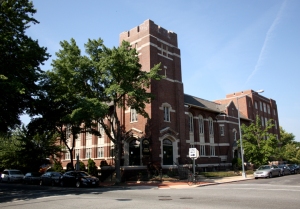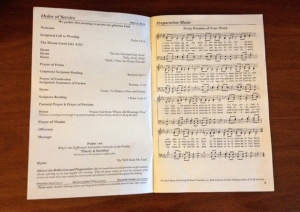
Young people fill the pews at Capitol Hill Baptist Church in Washington, D.C., pastored by Mark Dever.
COMMENTARY | Meredith Flynn
 A 16-page church bulletin leaves little to the imagination. At Capitol Hill Baptist Church in Washington, D.C., worship attenders know exactly what they’re getting into from the time they walk into the split-level, high-ceilinged sanctuary, less than a mile from the U.S. Capitol.
A 16-page church bulletin leaves little to the imagination. At Capitol Hill Baptist Church in Washington, D.C., worship attenders know exactly what they’re getting into from the time they walk into the split-level, high-ceilinged sanctuary, less than a mile from the U.S. Capitol.
The order of service, printed neatly on the inside cover page, lists every hymn, prayer, and Scripture reading. Every song is there in entirety – not just lyrics, but actual music.
Even the Nicene Creed gets its own page, with three paragraphs of explanation about where it came from and why we recite it. (“I said this in church for 28 years,” said one visitor, “and nobody ever explained it to me.”)
Your first impression is that this church is good at welcoming new people. They remember well that not everyone who walks in the door has been here before, and maybe they’ve never been in any church before. But it’s more than that. There’s a shrewdness here (in the nicest sense of the word), and an attention to detail that may be best matched just down the street under the Capitol Dome.
Capitol Hill Baptist Church is a church for its very unique city.
 What’s most interesting is that there are Millennials here – that elusive generation that’s giving churches fits around the country. A variety of ages are represented at Capitol Hill, but the congregation skews young. A few families sat in “bulkhead” seating at the back of the sanctuary, with a little extra leg room to accommodate a fidgety toddler. The rest of us were packed into crowded pews – between 900 and 1,000 are here for worship on Sunday mornings.
What’s most interesting is that there are Millennials here – that elusive generation that’s giving churches fits around the country. A variety of ages are represented at Capitol Hill, but the congregation skews young. A few families sat in “bulkhead” seating at the back of the sanctuary, with a little extra leg room to accommodate a fidgety toddler. The rest of us were packed into crowded pews – between 900 and 1,000 are here for worship on Sunday mornings.
Capitol Hill isn’t doing what most churches do to try to reach Millennials. Lately, the normal prescription is a relaxed dress code, coffee bar in the lobby, and maybe a violinist in the worship band. But here in Washington, what’s reaching Millennials is orderliness. And 5-minute prayers (four of them). And a 55-minute sermon based on one chapter of Psalms.
 “You will be bored if you don’t open your Bible and leave it open,” Pastor Mark Dever said before his message on Psalm 143. “All I’m gonna do is talk about what’s in the Bible.”
“You will be bored if you don’t open your Bible and leave it open,” Pastor Mark Dever said before his message on Psalm 143. “All I’m gonna do is talk about what’s in the Bible.”
The service lasted more than two hours, but people still stuck around to chat afterward. Some milled around the small bookstore tucked into a corner of the overflow room just off the main sanctuary. Coffee and cookies and conversation were had downstairs.
There are few surprises at Capitol Hill, besides the fact that this church on a quiet tree-lined street is ministering effectively in a difficult place, using methods that you never would have thought would work. Combined with age-old truth.
“You may have come in here as an adversary of God’s, an enemy,” Dever said at the end of his sermon. “But there’s no reason you have to leave that way.”
Meredith Flynn is managing editor of the Illinois Baptist newspaper.






We are Reformed Presbyterians in the DC area. Our Church is even more old school then Capitol Hill Baptist. We sing only the 150 Psalms and with no musical instruments and we have a fairly nice size congregation with mostly Millennials and Generation Xers with lots of younger children. Such a blessing to see.
LikeLike
Is the church pastured by Mark Batterson which is near the Capitol anywhere near this church? Are they similar?
LikeLike
I truly believe people (and young people) want the church and all it has stood for. They want Bible study and prayer. And those old hymns are really rich!
LikeLike
I could not be more in agreement with you nor could I be more excited to see what is happening within the Bride of Christ! Thank you, Lord. Oh how I thank you!!
LikeLike
Other churches in Washington that are growing are Calvary Baptist, St. John’s on Lafayette Square, and All Saints in Chevy Chase. It is possible to get the younger generations to come to church without coffee houses.
LikeLike
I, too, have been to a Weekender Conference for Pastor at CHBC. Dr. Dever does not have an inflated opinion of himself. They have a healthy respect for the Word of God both in doctrine and in practice. They believe in proclaiming the Word. The church is genuinely friendly and takes its calling seriously. They are preoccupied with faithfulness not with being trendy. God bless the good people of CHBC and its pastor!
LikeLike
What I read here definitely appears counter-trendy for American church culture. The first clue is the church name, which actually and unashamedly bears the title “Baptist” and even has the term “Church” in it! Marketing-savvy mavens would long since have morphed the name into something like “Capitol Hill Fellowship.” Then there’s the disputable sermon length, for which I can see arguments both ways. Then…well, real hymns? Nicene Creed? No wall-banging rock music? And did I hear there are statements of confession and absolution? I am intrigued, but must wonder if all this really says anything about millennials and their preferences, given the demographic of the area: I’d be interested in knowing what other options millennials have in the area, whether just as high a percentage of them can be found at a number of other types of churches on a Sunday morning, etc. I suppose the fact they are in church at all, especially if they are significantly involved, is still a wonderful statement!
LikeLike
It would be interesting to understand a bit more about the liturgy being used. Looks like it is more like a Word and Prayer service, rather than a Word and Communion service? Does the “Assurance of Pardon” section intend to be a Baptists version of “Confession and Absolution”? Are they following the Church Calender and using the Revised Common Lectionary for this scripture reading scheduled? There is so much I would like to learn about this Baptist Church and its liturgical practices. Wish i had a PDF of their order of service.
LikeLike
Maybe you would consider listening to one of the sermons there — would that give a flavor? http://www.capitolhillbaptist.org/audio/
LikeLike
The confession and assurance, while similar, differs in substance. The typical absolution, as I’ve experienced it, is the pastor/rector/priest granting the forgiveness as sort of a mediator. Our church, like Capitol Hill, is SBC and practices confession and assurance. This involves a moment of private and corporate confession. After such confession, the leader (usually a pastor) reads a scripture which assures the congregation of the forgiving nature of God. Anything extra scriptural included language of “we” and “us” and “our” instead of “you” and “your.” It is always an announcement or assurance, and never a grant, that our sins are forgiven due to the shed blood of Christ. We view it as Calvin did: it recalls to our minds our own sin and how needy we are. However, like Calvin, we also spurn the idea that the pastor is akin to the mediators of the Old Covenant. That is Christ alone and we are now a community of priests who intercede for each other through the one mediator.
LikeLike
First of all, the Gospel of Jesus Christ is the Power of God. This and this alone is what truly draws and causes a person to Love and grow in The Lord. It is truly All about Jesus! Lifting him up is what brings life and life more abundantly.. How long your service last shouldn’t matter.. That is if your truly there for Jesus! It is His Presence that we should be after.
LikeLike
This is great. As has been noted, DC has many more millennials than the average city, but the fact that a Baptist church (SBC, no less) is functioning on Sunday morning like the ancient confessional Church in the 21st century and still drawing that crowd speaks for
itself. Very odd to see a modern SBC church being openly confessional. I love it.
LikeLike
Great church, for sure, but it is important to note that the average person living in DC is a millennial. The city is crawling with millenials because of the governmental draw. Not sure there is a 1-1 correlation between what CHBC is doing and why millenials are drawn there.
LikeLike
It is an astonishing experience to worship there and we go every time we’re in Washington. We love the expository preaching and really great old hymns, sung with vigor!
LikeLike
Pastors these days love to tout the priority of the word to justify their endless sermons. They fly in the face of basic and proven teaching pedagogy. I’m sure he means well but this pastor along with many others across the nation insist on speaking for an hour, effectively making it about them. If you can’t say what you want to say in 30 or less, you either don’t know what you want to say or you have an inflated view of your own voice. Sad.
LikeLike
Not always the case. Some subjects and texts in the bible need more time for them to be fully exposited. My guess is you are used to topical preaching. So what say you?
LikeLike
I think your are right John … Believe me Dr. Dever both knows what he wants to say and has no inflated view of his own voice (neither did Jonathan Edwards or Charles Spurgeon and their sermons regularly exceeded what you will hear at CHBC)… What is truly sad is the lack of expositional preaching and the disservice churches have done conditioning people to 15 minute sermons that largely consist of anecdotes, stories and worldly advise.
LikeLike
Jeff, I don’t guess I can preach for an hour. I can’t imagine. However, I come from a teaching background and I regularly spoke ( and used other teaching methods) for a fifty-minute period. It’s really not THAT long. It’s just that we’re not accustomed to it. I wouldn’t say that to preach/teach for an hour indicates it’s all about us. I’m teaching a workshop next week, and they have me down for an hour each time??? Should I just do thirty minutes, or it’s all about me?
LikeLike
Jeff, that’s probably usually a pretty good assumption, however, as I mentioned above, maybe you would consider listening to one of the sermons there to know for yourself? http://www.capitolhillbaptist.org/audio/
My take is that if you can teach (preach in this case) well, the audience can absorb it.
LikeLike
People have the attention span to absorb whatever they have an appetite for. What’s sad is that so many have no appetite for GOd’s Word. Preach on Dr. Dever!
LikeLike
Personally I like longer sermons, but studies have consistently shown that, at best, people can only pay attention to 70% of a 40-minute lecture.
LikeLike
After 30 years in the ministry, I was discouraged. The churches I attended, while doctrinally sound, were going through the motions and in a state of denial concerning thei aging and declining membership and attendance. I lost count of the number of “We Are the Remnant” sermons I heard. My wife and I visited CHBC one Sunday and I was stunned. There was no loud praise band and no “special music”. I was in the middle of a predominately younger congregation who were joyfully singing hymns that were were full of sound doctrine and meaning. Every part of the service had purpose and the preaching was some of the best practical exposition I had heard in years. We were revived and renewed during our stay there. After 6 months, we asked about membership and were told “no” because our jobs and distance from the church would hinder our involvement. We were instead encouraged to check out a church plant that was more conducive to our situation and where we could get involved and where we serve today. Thank God for CHBC!
LikeLike
I have been to the weekender conference for pastors and leaders at CHBC and experienced firsthand the behind the scenes of CHBC. If you read Dever’s book, “Nine Marks of a Healthy Church”, you’ll see it lived out in practice there at the church. If more of our churches in the US, in the SBC particularly, will strive to implement this model, our churches will become healthy and accomplish what we have been commissioned to do.
LikeLike